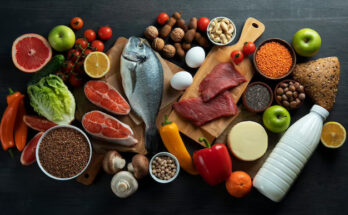Introduction
9 foods to avoid to prevent hot flashes On a Sunday morning, you wake up with plans to spend the day engaging in your hobbies when all of a sudden, you begin to feel as like you are roasting. Your skin turns crimson, and you start to perspire heavily.
This is a typical symptom of menopausal women. They start to experience hot flashes and nocturnal sweats on a regular basis. These symptoms can occasionally be so severe that they cause palpitations in the heart, anxiety, shortness of breath, etc. While it may appear that hormonal and non-hormonal therapy are the only way to relieve the symptoms, making changes to one’s lifestyle, such as adopting a nutritious diet and engaging in regular exercise, can be a game-changer.
The next blog post will focus on nine foods that prevent hot flashes while reviewing several food groups that might help relieve or aggravate menopause symptoms and how to treat them.
A Hot Flash: What Is It?
Hot flashes are caused by low levels of progesterone and/or declining oestrogen. The hypothalamus, the area of the brain in charge of controlling body temperature, basically becomes more sensitive to modest temperature changes in your body as a result of the decline in hormones that occurs during perimenopause.
During this period of change in the female body, even a small rise in body temperature might cause the hypothalamus to become more active than usual in an effort to cool the body.
When this happens, the blood vessels nearest to the skin’s surface widen to cool the body, which causes the quick perspiration that is linked with 9 foods that fight hot flashes. The outcome feels like an abrupt sensation of increasing heat from within the body.
Hot flashes are the most prevalent sign of perimenopause and menopause, affecting more than 75% of women between the ages of 45 and 52. Some people experience an increased heart rate, a flushed face and neck, and occasionally chills along with their hot flashes.
What Causes Vasomotor Symptoms?
The most prevalent menopause symptoms to start with are vasomotor symptoms. Night sweats and hot flashes are the two prominent symptoms. Although there is no one single, conclusive explanation for why vasomotor symptoms arise, doctors do believe that the hormonal imbalance and core body temperature may play a role.
WHAT IS THE DURATION OF HOT FLASHES?
Every woman experiences hot flashes differently in terms of duration and intensity. A heat flash can last from a minute to five minutes and can be moderate or severe. Although some women may have them for a longer period of time and 20% of women do not experience any hot flashes at all, they normally last for around seven years.
Hunger Can Set Off A Heat Wave
Before getting into the specific food groups that can help with hot flash symptoms, it’s crucial to note that hunger can cause your blood sugar to drop, which raises your adrenaline levels. This then triggers a hot flash episode.
9 foods to avoid during heat flashes
The following nine meals can help prevent heat flashes:
Fruits and vegetables:
The more you can include in your diet of fruits, vegetables, nuts, and legumes, the better. The frequency and severity of postmenopausal hot flashes and associated symptoms are drastically reduced by a plant-based diet, less oil consumption, and daily soybeans.
Complete Grains:
An adequate intake of fibre is necessary for a diet that is well-balanced. Whole wheat’s ability to control blood sugar and prevent hot flashes may be exactly what you’re looking for. Because white flour contains a lot of starch and carbohydrates, it should be avoided if possible. It might make hot flashes worse and make night sweats more frequent.
Foods high in phytoestrogen:
Phytoestrogens can mimic the effects of oestrogen. Phytoestrogen-rich foods can help control hot flashes and lessen the chance of menopausal weight gain. Soy products are among the best foods for menopause because they are high in phytoestrogen and low in fat. Other excellent candidates for the soy food groups include celery, chia seeds, green beans, oats, and legumes since they can lessen the uncomfortable symptoms of menopause.
Vitamin E use:
Sunflower seeds, shellfish, and avocados are rich sources of vitamin E. Vitamin E is a crucial element to take into account while altering one’s diet because studies show it lowers depression and lessens menopausal weight gain and hot flashes.
Healthy Fats:
Foods strong in omega-3 fatty acids, such fatty fish, have anti-inflammatory characteristics that help to lessen hot flashes. Additionally, these healthy fats shield women against issues with the coronary blood vessels, reducing the overall risk of heart disease.
Diet high in protein:
You must consume foods high in protein, such as meat, fish, and poultry, to maintain your muscle mass. For vegetarians and vegans, the following foods make good sources of protein: tofu, lentils, chickpeas, almonds, quinoa, and chia.
Water:
It’s important to not undervalue the advantages of drinking cold water in controlling menopausal hormone fluctuations. You can prevent bloating and dehydration by drinking 8 to 12 cups of water each day. Never skip the water; set reminders.
Cooling Foods:
Herbal remedies and green tea can help reduce hot flashes due to their cooling characteristics. Bok choy, cauliflower, and cabbage are examples of cooling foods because they help the body stay hydrated and maintain the proper electrolyte balance.
Mushrooms:
They contain a lot of selenium, a mineral that helps to reduce inflammation and oxidative stress. Hot flashes might result from an increase in adrenaline brought on by stress. Therefore, eating mushrooms daily can help your body cope with stress.
The nine meals that stop hot flashes are as follows.
Is There a Connection Between Eating Sugar and Hot Flashes?
According to studies, sugar seems to make hot flashes more frequent and more intense. Overindulging in sugar might cause heat flashes, which could have negative effects.
Hot flashes and chocolate
Hot flashes are thought to be brought on by foods and beverages that contain caffeine. Similar to this, eating chocolate in any form—liquid or solid—can only raise body temperature, which causes the body to overreact by releasing heat in the form of hot flashes.
Modifying Your Lifestyle to Reduce Hot Flashes
The greatest method to get over any medical problem is to try to adjust your lifestyle. Here are a few ways to adjust your way of living to get rid of hot flashes.
- Dress in layers so that you can shed them in the event of a heat flash.
- Avoid spicy foods, alcohol
- Caffeine as they tend to exacerbate the symptoms.
- Try to manage your weight. Obese women are more likely to experience frequent hot flashes, so working towards weight management can help alleviate the symptoms.
- Give up smoking.
Message From Revive
Women’s health clinical trials are being conducted by Revive Research Institute to treat the illnesses they experience and provide them greater control and self-assurance in their daily lives. Clinical trials for oral contraceptives, hot flushes, and uncomplicated UTIs are all actively being conducted.
Bottomline
Hot flashes make it more difficult to deal with the transition from the premenopausal to the menopausal era, which is a difficulty in and of itself. Hot flashes can have a negative impact on a woman’s mental health due to all the stress they cause. It gradually interferes with regular activities and lowers productivity levels.
Remember that selecting foods for hot flashes requires some trial and error. Therefore, it is crucial to pay attention to your eating habits and keep a close check on your symptoms so that they may be treated appropriately.



